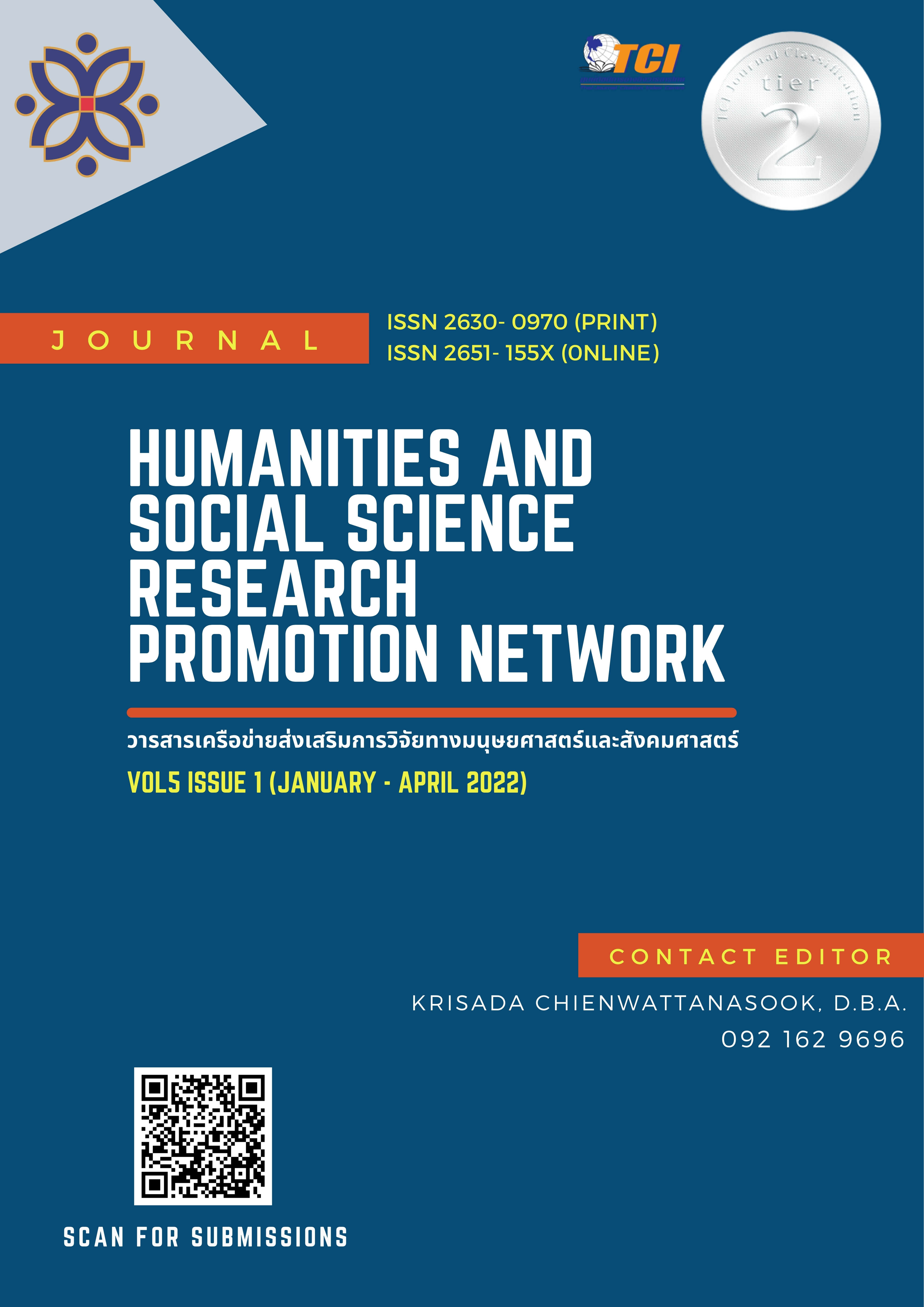การทบทวนวรรณกรรมผลกระทบของภาวะผู้นำในบริษัทโลจิสติกส์
คำสำคัญ:
อาเซียน, ทฤษฎีภาวะผู้นำ , บทบาทของผู้นำ , โลจิสติกส์ , ทฤษฎีผู้นำแห่งการเปลี่ยนแปลงบทคัดย่อ
วัตถุประสงค์ของการศึกษานี้เพื่อทำความเข้าใจภาวะผู้นำในบริษัทโลจิสติกส์และซัพพลายเชน การศึกษาก่อนหน้านี้ส่วนใหญ่จะเน้นศึกษาในแง่มุมฝั่งตะวันตก ซึ่งยังไม่ค่อยมีการศึกษาเกี่ยวกับองค์กรในเอเซียตะวันออกเฉียงใต้มากนัก นอกจากนี้ความสำคัญและบทบาทของกลุ่มธุรกิจโลจิสติกส์ในภูมิภาคอาเซียนมีเพิ่มสูงขึ้นเรื่อยๆ เนื่องจากมีการรวมตัวกันทางการขนส่งสินค้าภายในภูมิภาคมากขึ้น การทำความเข้าใจภาวะผู้นำในบริษัทโลจิสติกส์สามารถช่วยพัฒนาภาวะผู้นำในภาคอุตสาหกรรมนี้ในภูมิภาคอาเซียนได้ ซึ่งจะทำให้กระบวนการต่างๆของโลจิสติกส์และซัพพลายเชน มีประสิทธิภาพมากขึ้น ในการทบทวนวรรณกรรมนี้ จะกล่าวถึงทฤษฎีภาวะผู้นำในหลายรูปแบบ เช่น ทฤษฎีผู้นำแห่งการเปลี่ยนแปลง ทฤษฎีคุณลักษณะผู้นำ ทฤษฎีอุปนิสัย ภาวะผู้นำตามสภาวการณ์ ภาวะผู้นำแบบแลกเปลี่ยน ทฤษฎีภาวะผู้นำแบบความสามารถพิเศษ แนวคิดภาวะผู้นําแบบซับซ้อน หลังจากที่ได้ทบทวนวรรณกรรมพบว่า ทฤษฎีผู้นำแห่งการเปลี่ยนแปลง มีประโยชน์มากที่สุดที่จะนำมาปรับใช้ในบริษัทโลจิสติกส์และซัพพลายเชน ซึ่งผู้นำประเภทนี้จะต้องมีความยืดหยุ่นสูงและปรับตัวเข้ากับสถานการณ์ได้อย่างรวดเร็ว ในขณะเดียวกันทฤษฎีนี้ยังช่วยในการทำความเข้าใจความสัมพันธ์ระหว่างผู้นำและผู้ตามได้เป็นอย่างดี รวมทั้งจะช่วยให้เข้าใจในการจะทำให้องค์กรประสบความสำเร็จได้มีประสิทธิภาพอีกด้วย
เอกสารอ้างอิง
Agho, A. O. (2009). Perspectives of senior-level executives on effective followership and leadership. Journal of Leadership & Organizational Studies, 16(2), 159-166.
Azman, I., Mohamad, M. H., Rafiuddin, N. M., & Zhen, K. W. P. (2010). Transformational and transactional leadership styles as a predictor of individual outcomes. Theoretical and Applied Economics, 17(6), 89-104.
Burnes, B. (2005). Complexity Theories and Organizational Change. International Journal of Management Reviews, 7, 73–90.
Caruso, D. R., Fleming, K., & Spector, E. D. (2014). Emotional intelligence and leadership. In Conceptions of Leadership (pp. 93-110). Palgrave Macmillan US.
Cooke-Davies, T. (2011). Aspects of complexity: Managing projects in a complex world. Project Management Institute.
Deichmann, D., & Stam, D. (2015). Leveraging transformational and transactional leadership to cultivate the generation of organization-focused ideas. The Leadership Quarterly, 26(2), 204-219.
Dinh, J.E., & Lord, R.G. (2012). Implications of dispositional and process views of traits for individual difference research in leadership. The leadership quarterly, 23(4), 651-669.
Dubey, R., Gunasekaran, A., & Ali, S. S. (2015). Exploring the relationship between leadership, operational practices, institutional pressures and environmental performance:
A framework for green supply chain. International Journal of Production Economics, 160, 120-132.
Ewen, C., Wihler, A., Blickle, G., Oerder, K., Ellen, B. P., Douglas, C., & Ferris, G. R. (2013). Further specification of the leader political skill–leadership effectiveness relationships: Transformational and transactional leader behavior as mediators. The Leadership Quarterly, 24(4), 516-533.
Fujita, M., & Hamaguchi, N. (2016). Supply chain internationalization in East Asia: Inclusiveness and risks. Papers in Regional Science, 95(1), 81-100.
Goleman, D., Boyatzis, R., McKee, A. (2002). Primal Leadership: Realizing the Power of Emotional Intelligence. Boston, Mass.: Harvard Business School Press
Harrell, A., & Simpson, B. (2015). The dynamics of prosocial leadership: Power and influence in collective action groups. Social Forces, 94(3), 1283-1308.
Inyang, B. J. (2013). Exploring the concept of leadership derailment: Defining new research agenda. International Journal of Business and Management, 8(16), 78.
Kensbock, J. M., & Boehm, S. A. (2016). The role of transformational leadership in the mental health and job performance of employees with disabilities. The International Journal of Human Resource Management, 27(14), 1580-1609.
Kotter, J. P. (2001). What leaders really do. Harvard Business Review, 79(11), 85-96.
Kriger, M., & Zhovtobryukh, Y. (2016). The role of charismatic, transformational, and transactional leadership. In Strategic Leadership for Turbulent Times (pp. 83-92). Palgrave Macmillan, New York.
Li, Y., & Sun, J. M. (2015). Traditional Chinese leadership and employee voice behavior: A cross-level examination. The Leadership Quarterly, 26(2), 172-189.
Lichtenstein, B. B., Uhl-Bien, M., Marion, R., Seers, A., Orton, J. D., & Schreiber, C. (2006). Complexity leadership theory: An interactive perspective on leading in complex adaptive systems. Management Department Faculty Publications, 8.
Martinko, M. J., Harvey, P., & Douglas, S. C. (2007). The role, function, and contribution of attribution theory to leadership: A review. Leadership Quarterly, 18(6), 561-585.
Paschen, M., & Dihsmaier, E. (2014). Leadership, Power, and Dominance: How to Gain Power and Use It Maturely and Constructively. In The Psychology of Human Leadership (pp. 183-196). Springer Berlin Heidelberg.
Smalley, S. W., Retallick, M. S., Metzger, D., & Greiman, B. (2016). Analysis of Leadership Perceptions, Skills and Traits as Perceived by Agribusiness and Industry Professionals. NACTA Journal, 60(1a), 43.
Strang, S. E., & Kuhnert, K. W. (2009). Personality and leadership developmental levels as predictors of leader performance. The Leadership Quarterly, 20(3), 421-433.
Uhl-Bien, M., Marion, R., & Mckelvey, B. (2008). Complexity Leadership Theory: Shifting Leadership from the Industrial Age to the Knowledge Era. In M. Uhl-Bien, & R. Marion (Eds.), Complexity Leadership Part 1: Conceptual Foundations (pp. 185-224). Charlotte, NC: Information Age Publishing.
Vroom, V. H., & Jago, A. G. (2007). The role of the situation in leadership. American Psychologist, 62(1), 17–24.
Wu, J. B., Tsui, A. S., & Kinicki, A. J. (2010). Consequences of differentiated leadership in groups. Academy Of Management Journal, 53(1), 90-106.
ดาวน์โหลด
เผยแพร่แล้ว
รูปแบบการอ้างอิง
ฉบับ
ประเภทบทความ
สัญญาอนุญาต
ลิขสิทธิ์ (c) 2022 พรรณรจิต ฮาวรังษี, เกวลิน แท่นทอง, พุทธิวัต สิงห์ดง

อนุญาตภายใต้เงื่อนไข Creative Commons Attribution-NonCommercial-NoDerivatives 4.0 International License.
บทความที่ได้รับการตีพิมพ์เป็นลิขสิทธิ์ของ ผู้เขียน
ทัศนะและความคิดเห็นที่ปรากฏในบทความในวารสารเครือข่ายส่งเสริมการวิจัยทางมนุษยศาสตร์และสังคมศาสตร์จะถือเป็นความรับผิดชอบของผู้เขียนบทความนั้น และไม่ถือเป็นทัศนะและความรับผิดชอบของกองบรรณาธิการ








